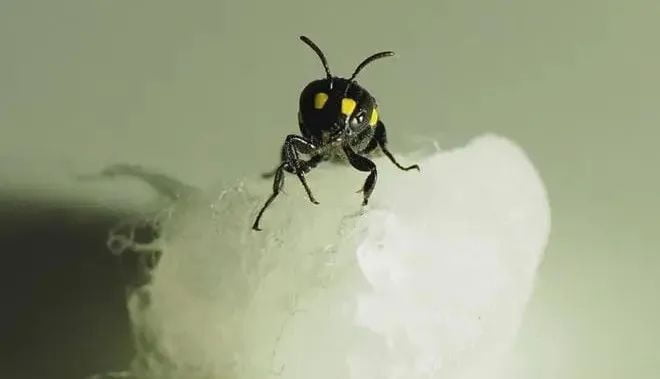Humble Bee Bio's mission is to create a biodegradable alternative to plastic by synthesizing the biology of honeybees, according to TechCrunch. While the New Zealand-based company is still in the early stages - it's halfway through its proof of concept - if Humble Bee is successful, its bioplastics could well enter the sustainable textile industry.
Humble Bee, which just raised $3.2 million in convertible notes as part of a Series A round, has been working on an Australian honeybee species that is a solitary bee that does not produce honey but makes a nesting material for larvae that has many plastic-like properties. "It's resistant to acids and bases. It's hydrophobic, it's waterproof, it's flame retardant, it's stable below 240 degrees Celsius," Ryan Graves, Humble Bee's chief technology officer, told TechCrunch. "The idea was, how do we recreate this?"

The team is using a synthetic biology approach that involves accessing the genetic code of the bee and identifying the genes and proteins responsible for the nesting material.
Humble Bee has extracted the code and is trying to recreate it in the lab. Next, the company will try to synthesize plastic-like materials, focusing on four different types of biomaterials that can be turned into fibers and fabrics for finishing.
Humble Bee aims to prove the concept any time between March and June 2023, when the team hopes to scale up production using industrial-scale fermentation technology.
"There's still a degree of exploration to be done," Graves says, "and these processes are time-intensive, they're challenging. Going from code to protein is typically a 12-month process, and then we need to scale up and get hundreds of grams out." Only then will Humble Bee be able to consider a business strategy, but Graves said the company has been approached by many textile companies and other companies that use upholstery. We know that companies such as Airbus, Toyota and Ford are working to implement circular economy practices that require consideration of the entire life cycle of their products.
Graves said, "Currently, when you look at the interior of the car, it's largely petrochemical-based, so it's degrading terribly."
The chief technology officer added that fashion brands have been engaging with Humble Bee Bio. According to a 2019 McKinsey study, environmental sustainability has become a priority for apparel companies, especially when it comes to responsible and sustainable sourcing of materials. So far, this has been most evident in sportswear brands such as The North Face, which uses Brewed Protein material for its Moon Parka, or Adidas, which has partnered with Bolt Threads to make shoes using a mushroom-based material.
There are a lot of different companies in this space, and that's one of the things that has allowed us to grow really fast," Graves said. We're standing on the shoulders of giants that have done a lot of work on spider silk. So you've got companies like Bolt Threads and Spiber that have a lot of market capital and are closer to the commercial end. They've made proof of concept garments, which is a big step above what we're trying to do here."
With Humble Bee's recent funding, the company aims to hire another senior scientist and continue to fund its outsourced R&D. Graves said New Zealand is not the best place to manufacture biotechnology because of some "old-school" genetic engineering laws, so it has looked to countries such as Thailand, the United States, Mexico and Argentina, where there is existing infrastructure in the field.
Graves says, "One of the benefits of doing biomanufacturing is that once you have the code, the actual engineered cells and basically the recipe for how to do the fermentation, it's possible to do a distributed manufacturing model."
If all goes well with the proof of concept, the company has its eye on the next round of funding and says it is looking for venture capital firms that are focused on the impact and climate space and are not risk averse.

